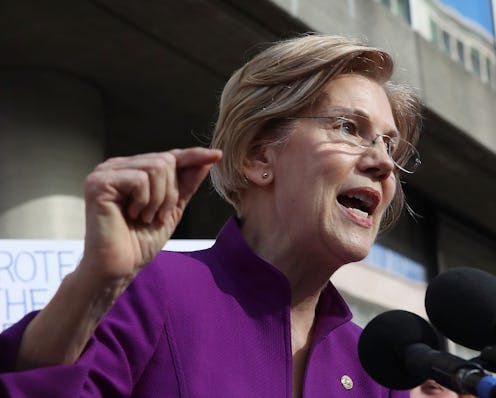
Saturday marked yet another heated exchanged between the president and one of his most vocal Massachusetts-based opponents. It didn't go unnoticed. After Trump called Elizabeth Warren "Pocahontas," she responded to the racially charged slur by pointing out just how poorly timed his name-calling was.
Trump has referred to Warren as "Pocahontas" many times over, long before being elected president. It is a jab at Warren's claim to Native American ancestry.
"Wacky Jacky is campaigning with Pocahontas," Trump said on Saturday, while stumping for Nevada Sen. Dean Heller, who is up for reelection in November. It was a two-punch statement, assigning a new nickname to Heller's challenger, Rep. Jacky Rosen, while also reviving the long-used pejorative for Warren.
Incidentally, Warren was also in Nevada on Saturday, actively campaigning for Rosen. When she caught wind of Trump's remarks, she clapped back at both a public event and on Twitter.
During a public question-and-answer session, Warren claimed that Trump was using name-calling as a way to distract from the massive amount of criticism his administration received over an ongoing immigration crisis. She was referring to the Trump's so-called "zero-tolerance" immigration policy, which resulted in thousands of children being taken away from their families upon illegally crossing the U.S.-Mexico border.
"How does he do that?" Warren asked, according to The New York Times. "He attacks Jacky Rosen and he throws out a racial slur at me." She then pointed out that Trump's continued use of the "Pocahontas" nickname contrasted starkly with the fact that the National Congress of American Indians (NCAI) was among those publicly condemning his administration's policies.
She doubled down on her remarks on Twitter.
"Americans are furious that @realDonaldTrump ripped thousands of babies & kids from their parents’ arms & has no plans to reunite them," Warren tweeted. "That’s what he’s hoping to distract from by attacking me & @RosenforNevada at a campaign rally in Vegas today."
She then reiterated her point that Trump may have chosen a poor time to revive her "Pocahontas" nickname.
"And if you want to talk about Native Americans, @realDonaldTrump, you should try listening to what the National Congress of American Indians (@NCAI1944) says about the pain you’re inflicting on children & families," she said. The tweet included a link to an NCAI statement about the Trump administration's mandatory family separation policy, which ended last week following massive public outcry from both Democrats and Republicans.
The statement pointed to the American government's deeply troubled history with Native American communities.
"The forced separation of immigrant children from their families is simply immoral and harkens back to a dark period for many Native American families," the statement read. It continued:
For decades, the U.S. government stole Native children from their parents and forced them into boarding schools hundreds and sometimes thousands of miles away. Our communities know too well the intergenerational psychological trauma that will flow from the actions that the United States is taking today.
The two campaign events played out almost simultaneously on Saturday. Democrats lambasted Heller for leveraging Trump's political clout on the campaign trail after he publicly came out against the administration's family separation policy. Rosen's camp suggested that Heller should have been more willing to stand by his beliefs.
"I don’t think President Trump could have picked a worse week to come to Nevada," said Rosen campaign spokesman Stewart Boss, according to The Washington Post. "If Senator Heller had a backbone, he would talk to the president about this issue."
In a statement, Rosen doubled down on her criticism of Heller.
"Dean Heller has been a rubber stamp for Donald Trump in Washington, caving to the president’s divisive agenda at Nevada’s expense," she said. "This was Senator Heller’s reward for his loyalty."
Saturday's electoral drama is part of the ongoing scramble to November's midterm elections. Many have characterized the elections as a referendum on Trump, and in return, the president has been vociferously campaigning for select members of his party. Saturday's tensions were heightened by Warren's presence and participation because many view her as a possible Trump challenger in 2020. She has thus far denied any interest in making a run.